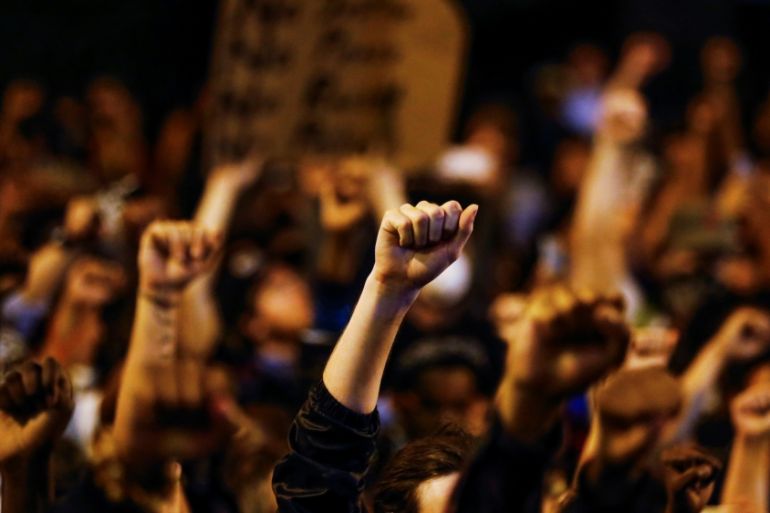Is the tide turning on oppressive leaders?
2017 was a year when many oppressed people across the globe made a defiant declaration in unison: That’s it.

As a celebrated Amnesty International prisoner of conscience once eloquently said; “Human beings want to be free and however long they may agree to stay locked up, to stay oppressed, there will come a time when they say, ‘That’s it’.”
2017 was a year when many oppressed people across the globe made that defiant declaration in unison: That’s it.
Keep reading
list of 4 itemsPalestinian Prisoner’s Day: How many are still in Israeli detention?
‘Mama we’re dying’: Only able to hear her kids in Gaza in their final days
Europe pledges to boost aid to Sudan on unwelcome war anniversary
It was the year when, in response to a lack of principled leadership on the world stage, millions decided to take matters into their own hands.
From Caracas to Warsaw; Harare to Washington, DC; Moscow to Tehran, people hit the streets to demand their rights in the face of bad governance, wide-ranging abuses of power and an increasing crackdown on freedoms.
For the leaders that callously undermined those rights, it should be a wake-up call – a message that there are political consequences for failing to meet the needs of the people.
One example comes from Poland, where the government’s attempts to extend its grip across the judiciary, NGOs and the media were met with massive protest as thousands joined marches to try to force the authorities to back down. And, in part, it worked as two repressive judicial reform bills were vetoed by the president at the 11th hour.
But the fight goes on. Not least for the protesters who may yet face prosecution for participating in demonstrations, and others who continue to face arrest for daring to speak out.
In Hungary, the space for protest has shrunk further still. Combined with a rapidly growing surveillance state and an extraordinary callousness towards refugees, there has been an alarming crackdown on independent voices under Prime Minister Viktor Orban’s increasingly repressive regime.
NGOs have been especially targeted with draconian measures designed to restrict their work and even put them out of business, Amnesty International among them.
Orban’s fearmongering rhetoric was emblematic of a disturbing global trend towards intolerance and discrimination – a scene that was set in January by the US government’s move to ban the entry of people from several Muslim-majority countries.
Amid a vacuum of global leadership on human rights, it was left to the people to stand up for justice. And when they did, it raised the political cost of repressive actions – as the protests in Poland showed.
In this year of resistance, shoots of hope sprouted in some unlikely locations as the backlash against regressive policies secured important victories for human rights. These included the lifting of the total abortion ban in Chile, achieving a step towards marriage equality in Taiwan and securing a landmark victory against forced evictions in Abuja, Nigeria.
We have also recently witnessed the fall of two divisive African leaders, as both Zimbabwe’s Robert Mugabe and South Africa’s Jacob Zuma were pressured out of office after years of unrest and protest. The resignation of Ethiopia’s Hailemariam Desalegn, weeks after he announced the release of thousands of prisoners, has also sparked hopes of positive change in Ethiopia. Time will tell if these countries’ new leaders truly deliver human rights reform.
Many activists, old and new, were inspired to protest for the rights of women, from Latin America’s Ni Una Menos movement – which denounced violence against women and girls – to the #MeToo phenomenon that spread on social media.
This resurgence of activism showed the importance of people standing up and making the case for hard-won values while demanding their economic and social rights.
In the words of that eloquent Amnesty prisoner of conscience; “Suddenly, they find themselves doing something that they never would have thought they would be doing, simply because of the human instinct that makes them turn their face towards freedom.”
The quote comes from Aung San Suu Kyi, for years the face of the struggle for human rights in Myanmar, but whose commitment to justice was gravely questioned in 2017. Her failure to speak out against the military’s campaign of ethnic cleansing against the Rohingya people was one of this year’s most sobering reminders that we cannot rely solely on our leaders to protect our human rights for us.
Faced with this realisation, people across the world have found strength and unity in each other, and created new ways to organise and resist. By standing with those who face injustice and oppression, by joining them in saying “That’s it” we can all play a part in this powerful resistance.
The views expressed in this article are the author’s own and do not necessarily reflect Al Jazeera’s editorial stance.
